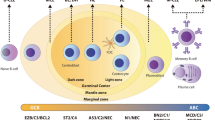Abstract
Identification of mutations in the BRCA2 gene and estimation of their clinical consequences for women and men treated in the Maria Sklodowska-Curie Memorial Cancer Center Warsaw, Poland in the years 1998–2008. The probands (97 women and 8 men) had a family history of breast and ovarian cancer (median age 46). The presence of molecular changes was examined in DNA isolated from peripheral blood lymphocytes. Germline mutations in 27 exons of the BRCA2 gene were screened by ‘touchdown’ PCR amplification, DHPLC and sequencing. Missense mutations were classified by multiple-sequences alignments of orthologous BRCA2 protein sequences with T-Coffee software. 39 molecular changes (8 novel) were identified in the BRCA2 gene in 105 investigated patients. In 12 patients the following pathogenic mutations were identified: 5467insT, 6174delT, 6192delAT, 6675delTA, 8141del5, 9152delT, 9326insA, 9631delC, IVS23-2A > G and E394X. The presence of 10 missense type mutations was detected including the following: D1420O, T1915 M, N3124I. The determination of pathogenic status of molecular variants detected in BRCA2 gene, described in the BIC mutation database as ‘UV’ depends on many parameters. Important is the assessment of the evolutionary conservation of their protein sequences and studying of the frequency of molecular variants detected in breast cancer patients and in population. A high diversity was found of the pathogenic mutations detected in BRCA2 gene in the Polish population.

Similar content being viewed by others
References
Hansen TVO, Bisgaard ML, Jonson L et al (2008) Novel de novo BRCA2 mutation in a patient with a family history of breast cancer. BMC Med Genet 9:58
Couch FJ, Jonson MR, Rabe KG et al (2007) The prevalence of BRCA2 mutations in familial pancreatic cancer. Cancer Epidemiol Biomark Prev 16:342–346
Antoniou A, Pharoah PD, Narod S et al (2003) Average risks of breast and ovarian cancer associated with BRCA1 or BRCA2 mutations detected in case Series unselected for family history: a combined analysis of 22 studies. Am J Hum Genet 72(5):1117–1130
Chen PL, Chen CF, Chen Y et al (1998) The BRC repeats in BRCA2 are critical for RAD51 binding and resistance to methyl methanesulfonate treatment. Proc Natl Acad Sci USA 95:5287–5292
Salgado J, Zabalegui N, Garcia-Amigot F et al (2005) Structure-based assessment of BRCA1 and BRCA2 mutations in a small Spanish population. Oncol Rep 14:85–88
Csokay B, Udvarhelyi N, Sulyok Z et al (1999) High frequency of germ-line BRCA2 mutations among Hungarian male breast cancer patients without family history. Cancer Res 59:995–998
Wu K, Hinson SR, Ohashi A et al (2005) Functional evaluation and cancer risk assessment of BRCA2 unclassified variants. Cancer Res 65:417–426
Easton DF, Deffenbaugh AM, Pruss D et al (2007) A systematic genetic assessment of 1.433 sequence variants of unknown clinical significance in the BRCA1 and BRCA2 breast cancer-predisposition genes. Am J Hum Genet 81:873–883
Goldgar DE, Easton DF, Deffenbaugh AM et al (2004) Integrated evaluation of DNA sequence variants of unknown clinical significance: application to BRCA1 and BRCA2. Am J Hum Genet 75:535–544
Thompson D, Easton D (2001) Variation in cancer risk, by mutation position, in BRCA2 mutation carriers. Am J Hum Genet 68:410–419
Wagner T, Stoppa-Lyonnet D, Fleischmann E et al (1999) Denaturing high-performance liquid chromatography detects reliably BRCA1 and BRCA2 mutations. Genomics 62:369–376
Notredame C, Higgins DG, Heringa J (2000) T-Coffee: a novel method for fast and accurate multiple sequence alignment. J Mol Biol 302:205–217
BIC (Breast Information Core) database. http://www.research.nhgri.nih.gov/bic/
Chodick G, Struewing JP, Ron E et al (2008) Similar prevalence of founder BRCA1 and BRCA2 mutations among Ashkenazi and non-Ashkenazi men with breast cancer: evidence from 261 cases in Israel, 1976–1999. Eur J Med Genet 51:141–170
Distelman-Menachem T, Shapira T, Laitman Y et al (2009) Analysis of BRCA1/BRCA2 genes’ contribution to breast cancer susceptibility in high risk Jewish Ashkenazi women. Fam Cancer 8:127–133
Haraldsson K, Loman N, Zhang Q et al (1998) BRCA2 germ-line mutations are frequent in male breast cancer patients without a family history of the disease. Cancer Res 58:1367–1371
Thomassen M, Hansen TVO, Borg A et al (2008) BRCA1 and BRCA2 mutations in Danish families with hereditary breast and/or ovarian cancer. Acta Oncol 47:772–777
Grzybowska E, Zientek H, Jasińska A et al (2000) High frequency of recurrent mutations in BRCA1 and BRCA2 genes in Polish families with breast and ovarian cancer. Hum Mutat 16:482–490
Bignell G, Micklem G, Stratton MR et al (1997) The BRC repeats are conserved in mammalian BRCA2 proteins. Hum Mol Genet 6:53–58
Kwiatkowska E, Teresiak M, Lamperska K et al (2001) BRCA2 germline mutations in male breast cancer patients in the Polish population. Hum Mutat 17:73
Davies AA, Masson J-Y, Mcllwraith MJ et al (2001) Role of BRCA2 in control of the RAD51 recombination and DNA repair protein. Mol Cell 7:273–282
Górski B, Narod SA, Lubiński J (2005) A common missense variant in BRCA2 predisposes to early onset breast cancer. Breast Cancer Res 7:R1023–R1027
Spurdle AB, Hopper JL, Chen X et al (2002) The BRCA2 372 HH genotype is associated with risk of breast cancer in Australian women under age 60 years. Cancer Epidemiol Biomark Prev 11:413–416
Healey CS, Dunning AM, Teare MD et al (2000) A common variant in BRCA2 is associated with both breast cancer risk and prenatal viability. Nat Genet 26:362–364
Palli D, Falchetti M, Masala G et al (2007) Association between the BRCA2 N372H variant and male breast cancer risk: a population- based case-control study in Tuscany, Central Italy. BMC Cancer 7:170
Jakubowska A, Nej K, Huzarski T et al (2002) BRCA2 gene mutations in families with aggregations of breast and stomach cancers. Br J Cancer 87:888–891
Author information
Authors and Affiliations
Corresponding author
Rights and permissions
About this article
Cite this article
Balabas, A., Skasko, E., Nowakowska, D. et al. Novel germline mutations in BRCA2 gene among breast and breast-ovarian cancer families from Poland. Familial Cancer 9, 267–274 (2010). https://doi.org/10.1007/s10689-010-9338-5
Published:
Issue Date:
DOI: https://doi.org/10.1007/s10689-010-9338-5




